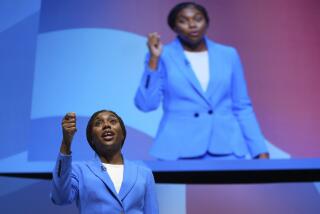Britain’s Conservatives Pass Torch to Fresh Face Promising New Ideas
LONDON — Britain’s Conservative Party anointed 39-year-old David Cameron as its leader Tuesday, hoping that the polished, clean-cut “old Etonian” has the magic to lead the Tories out of the political wilderness after three election defeats.
Virtually unknown to the country at large six months ago, Cameron outpolled rival David Davis by better than 2 to 1, taking 134,446 votes to Davis’ 64,398.
Cameron survived a contest to succeed retiring leader Michael Howard that began with five hopefuls and went on for almost five months. He gained momentum with his smooth, relaxed speech at the Conservative Party conference in October.
Raised in the Berkshire countryside in a well-to-do family and married to the daughter of a baronet, Cameron had been the favorite since the conference.
His greatest campaign challenge may have been standing up to reporters’ questions about whether he had used cocaine while studying at Oxford University. (He avoided answering, arguing that politicians’ past lives should remain private.)
With British voters having given the Labor Party’s Tony Blair a third term as prime minister in May, Cameron was expected to pledge to put the Conservatives back in touch with ordinary people -- just as the last three party chairmen have promised. But it remains to be seen whether he will be any more effective than his predecessors.
The Conservative Party has been dogged by the perception that it is a declining club for white, elderly, hunt-riding, middle-class, rural and suburban southern Englanders who belong to the Church of England. (Cameron noted Tuesday that women are “scandalously underrepresented” in the party and pledged to correct that.)
But changing the Tories’ image would be a daunting task, and Cameron’s background may be a drawback. He has conceded that he had a “hideously privileged” upbringing that included an education at the highbrow Eton school. He has only 4 1/2 years’ experience as a member of Parliament, though he cut his political teeth as a young party worker and aide to Howard and former Chancellor of the Exchequer Norman Lamont.
The last Tory leader to win a general election was John Major, who led the Conservatives to victory in 1992 after the party revolt that deposed Margaret Thatcher.
Labor rolled up massive majorities in the 1997 and 2001 parliamentary elections after Blair moved the left-leaning party toward the center of the political spectrum. The Tories made inroads in the May election but still lost. Now, Cameron should have four years to hone his message before the next election, which probably will not take place before 2009.
Cameron represents a new generation of Tories who argue that there is a growing appetite for change in the country after eight years of Labor rule.
He has advocated freer markets, lower taxes and greater investment in infrastructure. But during the campaign, he was criticized as being long on generalities and short on specific policies.
As the father of two young children, including a son disabled by cerebral palsy and epilepsy, Cameron has declared a special commitment to education. He also frequently speaks of the need to address global warming and reduce carbon emissions into the environment.
On Tuesday, he rode his bicycle to work from his London home, a trip he said would have been “carbon neutral” if the BBC had not sent a helicopter to follow his progress.
“I want us to give to this country a model of compassionate conservatism that is right for our times and is right for our country,” he said as he accepted the party’s mantle.
Looking calm and at ease in a dark suit and modish lime tie, the new leader alluded to his youth and what he considers the Labor Party’s hoariness; both Blair and his heir apparent, Gordon Brown, the finance chief, are in their 50s.
“They are yesterday’s men with yesterday’s measures,” Cameron said. It was the kind of remark that Blair often throws at the Tories.
Before vanquishing Davis -- a candidate rougher in persona and more plebeian in origin -- in the rank-and-file party vote, Cameron had seen off three others in a series of ballots by the Tory caucus in Parliament. They were former finance chief Kenneth Clarke, former Foreign Secretary Malcolm Rifkin and Parliament member Liam Fox.
For now, Cameron appears to have wide support within the party. Thatcher sent a message wishing him well. Julie Kirkbride, a Conservative member of Parliament, said there would be no lasting scars from the long but cordial leadership fight, which seems to have revitalized the party’s spirit. “We’re all Cameroons now,” she quipped to the BBC.
Even Clarke commented, “Nothing brings politicians back to sanity like three election defeats.”
Cameron will have his first challenge in the new post at noon today, when he must stand up to Blair at the weekly prime minister’s question time in the House of Commons.
More to Read
Sign up for Essential California
The most important California stories and recommendations in your inbox every morning.
You may occasionally receive promotional content from the Los Angeles Times.










